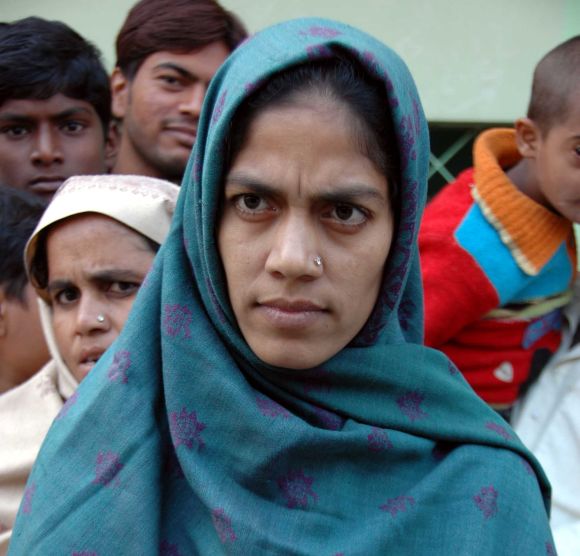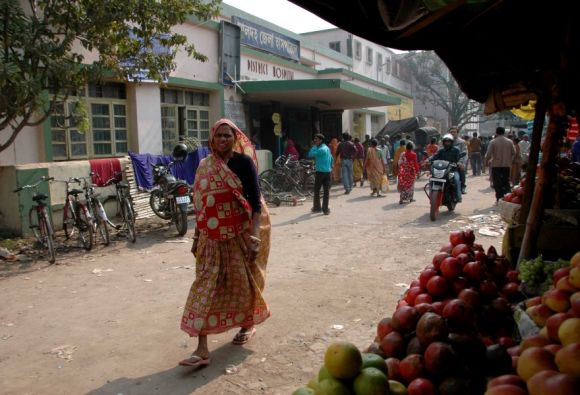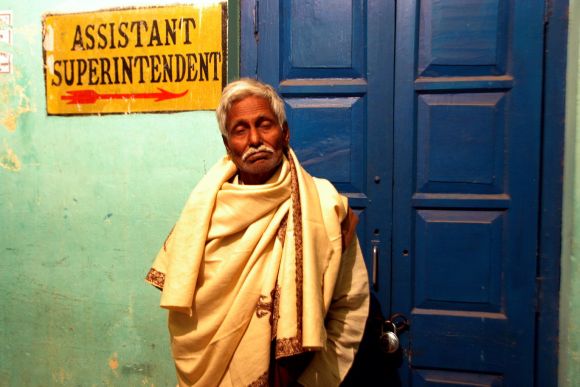 | « Back to article | Print this article |
'I'll never forgive the doctors of Malda Hospital'
After reporting on the alarming story of West Bengal's Malda Medical College and Hospital, where hundreds of children have lost their lives due to alleged negligence, Indrani Roy speaks to the relatives of some of the ill-fated patients.
This is the second part of the three-part series.
Read Part I: Why are children dying in Bengal's Malda district?
We left no stone unturned to get details of the dead infants from the hospital register but in vain.
The superintendent and assistant superintendent of the hospital refused to utter a word on the issue, whereas Malda Medical College and Hospital principal Ucchalkumar Bhadra seemed to be in denial mode.
However, we tracked the addresses of a couple of patients' kin from hospital insiders.
Many of the babies that died at the hospital hailed from Malda's Milki area. We set out for the place early morning.
Jahanara Bibi, a resident of Malda's Milki gram panchayat, is an epitome of gloom.
After four daughters, when she got pregnant again, the poor Muslim family was overjoyed.
Little did they know what was in store.
On the day of labour, Jahanara was taken to Malda Medical College and Hospital and on reaching there, she was immediately shifted to the operation theatre for a caesarian delivery.
"In a semi-conscious state, I heard a voice whispering into my ears, 'Mubarak ho! (Congratulations!) you have a baby boy," Jahanara told Rediff.com.
"My folks would be so happy with the arrival of a new member, I thought. It was bliss."
But Jahanara's happiness lived only for a few days.
"On the third day, my baby developed breathing infection and despite my repeated pleas to the doctors and nurses, he failed to get proper and timely care.
"After a while, my baby's heart gave way. I was holding him so tight didi till his last breath," said Jahanara, her eyes welling up.
"Life was snuffed out of my little one's body. I will never forgive the doctors of Malda Hospital," she said.
"After this tragedy, I promised to myself, I shall never ever visit that rotten place. If I am sick, I would like to die here."
Click NEXT to read further. . .
'We did not want a poriborton of this kind'
Last week, Deepa Dasmunsi, Union minister of state, urban development, and Abu Hasem Khan Chowdhury, Union minister of state, health and family welfare, visited the Malda Hospital to review the situation following the crib deaths.
"Several hundred children died at the hospital last year too. Still the situation has not been changed," said Dasmunsi, who also talked to the hospital authorities.
Khan Chowdhury dismissed the hospital authorities' explanation that they were under tremendous pressure as patients come to them from even neighbouring districts and adjacent states.
"It is normal that patients will come to a medical college hospital even from outside. But the way it is being raised as an excuse is not right," he told mediapersons, who had gathered at the hospital.
"It's a sad situation and something needs to be done on a war footing," Dasmunsi said.
Meanwhile, West Bengal Governor M K Narayanan had also expressed concern over infants' deaths in Malda Medical College Hospital.
"The deaths in Malda are unfortunate... The problem exists and I hope it will be solved soon," Narayanan said in his chancellor's address at the 33rd convocation of Burdwan University.
"The administrative machinery in this regime is getting weaker every day," said a ruling Trinamool Congress activist on condition of anonymity.
"In fact, the entire healthcare system of West Bengal is littered with glitches. We did not want a poriborton (change) of this kind.
"Take the case of this hospital. There is no coordination between the governing body and the staff. An all-pervading sense of mistrust runs through the veins of Malda Hospital.
"As a result, patients, adults as well as infants, are getting little or no treatment at all," the man, in his fifties, told Rediff.com.
Click NEXT to read further. . .
The dying state of healthcare in a Bengal district
The Trinamool activist's words were seconded by sixty-year-old Hasimuddin Ahmed.
He had brought his son-in-law to this hospital for treatment.
"He has jaundice. Though we admitted him here three days back, he did not get any treatment till yesterday.
"And now, he has developed lung infection, we are told," said Ahmed, rubbing off tears from his tired eyes.
We followed him to his son-in-law's bed and stood speechless beside the emaciated 30-year-old man, panting heavily.
"Can't you do something to relieve him," we asked the lone sister available in that ward at that time.
And a stern glare is all that we got for an answer.
"I have phoned the doctor in-charge. He will be here any minute."
(However, Ahmed told us that he had been hearing the same assurance for the last couple of hours)
Before we could retort, the nurse barked at us: "Who are you?
"What do you want?
"Are you from the Press?
"Do you have a camera?
"Please leave the hospital premises immediately.
"If the doctors find you here, we will lose our jobs."
And if the doctor whom she phoned did not arrive there that minute, the young man might lose his life, is what I wanted to shout back to the angry lady, but left quietly as I did not want to disturb the other patients.
The image of Ahmed's son-in-law remained etched in our minds as we walked out of the hospital main gate -- he represented the dying state of healthcare in a district of Bengal.
His condition spoke eloquently of the neglect and indifference that the poor of our native land are subjected to each time they fall sick.
(To be continued)


